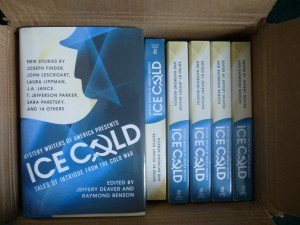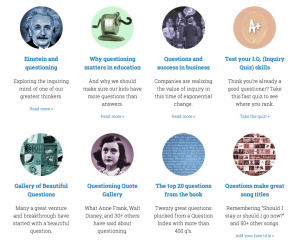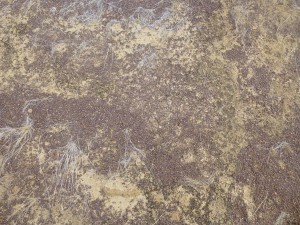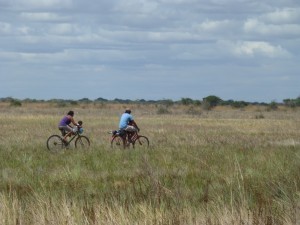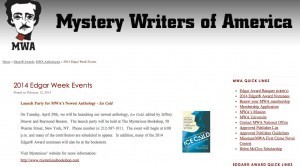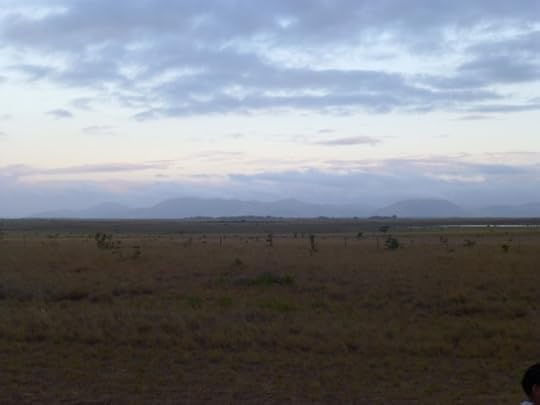Joseph Wallace's Blog, page 2
March 28, 2014
Eat This Book!
So, as part of the International Edible Books Festival–in which enterprising bakers transform their favorite works of literature into dessert–my nephew Tucker came up with the idea for the below entry, based on my new, not obviously food-friendly novel, Invasive Species. It was then turned into an eye-opening reality by his brother Jonah and their mom and dad.
Guess what they called it?
Invasive Reeses, of course!
And you can’t even see the “eggs” inside!
The post Eat This Book! appeared first on Marmaduke Writing Factory.
March 17, 2014
Happy Anonymity
If you look closely, you’ll notice that my name isn’t even on the front cover of this collection of short stories, the latest in the Mystery Writers of America‘s annual series of “themed” anthologies. (Ice Cold will be published out next month.)
Then why am I so excited?
Well, first of all, look at whose names take up all that cover space: Laura Lippman, Joseph Finder, T. Jefferson Parker, Sara Paretsky et al. It will be another lifetime before I can be jealous about being edged out by such talented and successful authors, people I admire so much.
Secondly, my story “Deep Submergence” is in the book alongside their works!
Thirdly, as part of their Edgar Week Festivities, the MWA will be hosting a launch party for Ice Cold at the Mysterious Bookshop in Manhattan on Tuesday, April 29. I’ll be there, which means that I’ll get to meet some of these writing heroes of mine.
And lastly, writing “Deep Submergence”–which is set mostly onboard a deep-sea research submarine–inspired me to write my newest novel, currently titled Something Terrible Has Happened. I’ve written the first draft, and will be returning to it as soon as I’m done with The Slavemakers, my sequel to Invasive Species.
In the face of so much fulfillment, what’s a little front-cover anonymity? Answer: Nothing.
The post Happy Anonymity appeared first on Marmaduke Writing Factory.
Calling All Biographers!
A s the survivor of writing two cradle-to-grave biographies, I am an active member of Biographers International Organization. We are a relatively new group and are having our 5th annual conference at UMass Boston, May 16-18, 2014 with three days of panels; tours and receptions; and opportunities to meet with literary agents..
s the survivor of writing two cradle-to-grave biographies, I am an active member of Biographers International Organization. We are a relatively new group and are having our 5th annual conference at UMass Boston, May 16-18, 2014 with three days of panels; tours and receptions; and opportunities to meet with literary agents..
The conference is aimed at working biographers, but anyone interested in the craft of – and/or reading of — biography is welcome. It’s a great group: there’s something about writing about someone else’s life that makes one a better — or, at least, more empathic — person, I firmly believe!
The main conference day is Saturday, May 17, with more than 20 panels — I will be moderating a panel, Cultivating Blurb Writers, and will be a panelist on What Happens After You Turn in Your Manuscript? – plus a keynote address by Pulitzer-prize winning biographer Stacy Schiff (Cleopatra; Véra), and a net-working reception and award ceremonies for the Plutarch Award for Best Biography of 2013 and the BIO/Hazel Rowley Prize. Pre-conference tours to Boston archives and libraries are scheduled for May 16th, and master classes with veteran biographers are offered on May 18th. www.biographersinternational.org/conference.
If you come, do find me to say hello. I’d love to welcome you to the art and craft of biography.
The post Calling All Biographers! appeared first on Marmaduke Writing Factory.
March 13, 2014
Do you have a “beautiful question” you’d like to share with the world? (and if not, maybe you should)
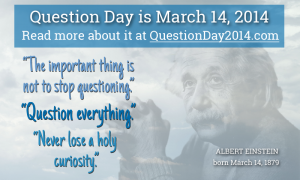
Tomorrow, March 14, is “Question Day 2014,” in honor of that master questioner Albert Einstein, who was born on that date, 135 years ago. Einstein is known for his curiosity and passion for questioning. He told us, “The important thing is not to stop questioning” and urged us to “Question everything” and “Never lose a holy curiosity.”
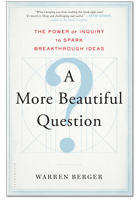 I happen to be very interested in questioning myself. My book, A More Beautiful Question, is all about the surprising power of questioning to transform our lives and spark big breakthroughs. The book was published last week by Bloomsbury and now, of course, I’m in full promotion mode. And that’s why I couldn’t just let Einstein’s birthday pass by without marking it.
I happen to be very interested in questioning myself. My book, A More Beautiful Question, is all about the surprising power of questioning to transform our lives and spark big breakthroughs. The book was published last week by Bloomsbury and now, of course, I’m in full promotion mode. And that’s why I couldn’t just let Einstein’s birthday pass by without marking it.
An official Einstein’s birthday / Question Day connection was made in 2008 when National Question Day was declared by an entity called the Inquiry Institute. This year, in partnership with the nonprofit Right Question Institute (which teaches kids in schools across the country how to ask better questions), we’re sponsoring a day of celebrating questioning, via social media and the QuestionDay2014.com website. There’s lots of interesting info and links on that microsite—take a moment to check it out.
Why questions matter
We’re inviting you to go on Twitter*, LinkedIn, and Facebook and share a thought about the importance of questioning, or a famous quote (you can find plenty of them here; feel free to borrow one and tweet it). Or, better yet, share your own question with the world: Is there a “Why…” “What if…” or “How might we…” question that’s particularly meaningful to you? If you like to share listicles, here’s a link to a funny gif-laden “12 Questions That Changed Everything (and 1 Statement That Will)” in Buzzfeed (http://bzfd.it/1ia3l91). And to find out what happens when Benedict Cumberbatch and Kanye West (among others) release their inner Einstein, see the “Einstein Fusion” Slideshare below.
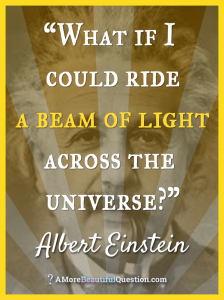
Albert Einstein’s “beautiful question” as a teenager
Or you can just say, “Hooray, it’s Question Day!”
The sponsors of this event think it’s worthwhile to try to increase awareness and appreciation of questioning. Questions enable us to learn and understand; they often spark new ideas; and they tend to be the starting point of innovation (and a good starting point of conversation, as well).
So to all the readers who follow the Marmaduke group and our site (by the way, my book on questioning was written almost entirely in the Marmaduke-Forster House), I invite you to take part in the conversation on questioning on Friday. Thanks for helping us spread the word about the importance of questioning, and about why we should never lose what Einstein called our “holy curiosity.”
*Tweets:
You can simply retweet my tweets at @GlimmerGuy or here are some sample tweets:
Celebrating Einstein’s birthday as #QuestionDay2014. Let’s ask more & better questions. http://QuestionDay2014.com
“The important thing is not to stop questioning.” Einstein’s birthday is today. http://QuestionDay2014.com #QuestionDay2014
Hashtag: #QuestionDay2014
P.S. If you’re member of Goodreads.com, they’re doing a weeklong book giveaway of A More Beautiful Question starting March 14.
Einstein Fusion: 10 Celebrities Who Have a Little Einstein Inside Them from Warren Berger
The post Do you have a “beautiful question” you’d like to share with the world? (and if not, maybe you should) appeared first on Marmaduke Writing Factory.
March 9, 2014
INVASIVE SPECIES in Hardcover!
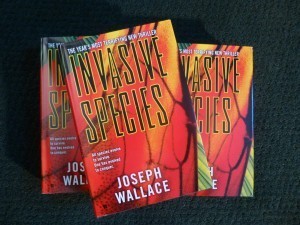 When your novels are published as paperback originals, as mine have been, seeing them in a hardcover is a bittersweet experience. In a way, it’s like getting a tangible glimpse of the Road Not Taken or the Ghost of Novels Yet To Come. (At least possibly.)
When your novels are published as paperback originals, as mine have been, seeing them in a hardcover is a bittersweet experience. In a way, it’s like getting a tangible glimpse of the Road Not Taken or the Ghost of Novels Yet To Come. (At least possibly.)
For me, it’s mostly a fun way to add a new book to my bookshelf, right next to the paperback version that most everyone owns.
As soon as Invasive Species was sold to the book clubs, I knew I’d be getting some hardcover mementos, and this week the package arrived. If you’d like one of your own, check out The Book of the Month Club, The Scientific American Book Club, The History Book Club, among others.
And don’t forget: If you’d like a signed bookplate to adorn your copy (hardcover or paperback) just let me know through this blog or my website, http://www.josephwallace.com/, and I’ll send it right off to you.
The post INVASIVE SPECIES in Hardcover! appeared first on Marmaduke Writing Factory.
March 2, 2014
My Madeleines
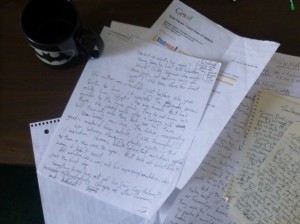 I write my novels on the computer, but before I start I take extensive notes…usually on paper.
I write my novels on the computer, but before I start I take extensive notes…usually on paper.
Not just paper, but whatever paper is handy when I get an idea. Others may have elegant journals ever at their side, but I don’t. Instead, I scrawl my thoughts on old receipts and the backs of maps, pages torn from spiral notebooks and computer paper so spindled and mutilated it would jam even the most forgiving printer.
When I mentioned this habit on Facebook a few days ago, people asked if I subsequently transfer my notes to computer files. The answer is: No, I don’t. Regardless of how indecipherable they are, I leave them as I wrote them.
The question is, Why?
It’s more than just laziness. In their original state, my notes, however frayed and messy, do more than record my thoughts: They open a window to the moments when I was most inspired, to the rare times when a too-often-silent part of my creative brain kicked into gear and my stories seemed to unfold almost on their own.
Just by looking at the frayed printout, the ticket receipt from StubHub, the pages of lined paper that recorded a friend’s adventures in Kenya, I’m instantly transported to the moment I first grabbed pen and paper and started writing. More importantly, by traveling back in time in this way, I can reclaim my inspiration. I can tap into what first excited me in a way I never can when looking at notes transcribed into a Word document. Sometimes a single scrawled note can, weeks later, grow into an entire chapter or plot thread–all because I remember who and where I was when I first wrote it.
So, regardless of how messy my system is (and it is messy; you should see the notes I used to take after swimming laps in the town pool!), I’m not going to change a thing. For me, inspiration is hard enough to come by. If it requires filling file folders and envelopes with scraps of marked-up paper, that’s a tradeoff I’m happy to make.
The post My Madeleines appeared first on Marmaduke Writing Factory.
February 23, 2014
Where You Find It
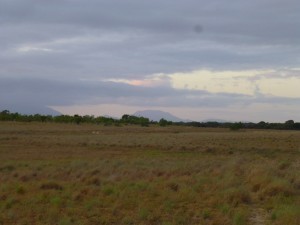 I didn’t travel to Guyana seeking inspiration for The Slavemakers, the new novel–and follow-up to Invasive Species–I’m just starting to write. I visited that little-known country for a diversity of reasons, foremost among them that I’m enamored by the South American rain forest and its mysteries; I love meeting people whose lives are so different from my own; and (as I described in “The Unlikely Writer Who Changed My Life”) Guyana was the setting of a book I first read at age ten, and which influenced my choices to be a writer on nature, the environment, and exotic travel.
I didn’t travel to Guyana seeking inspiration for The Slavemakers, the new novel–and follow-up to Invasive Species–I’m just starting to write. I visited that little-known country for a diversity of reasons, foremost among them that I’m enamored by the South American rain forest and its mysteries; I love meeting people whose lives are so different from my own; and (as I described in “The Unlikely Writer Who Changed My Life”) Guyana was the setting of a book I first read at age ten, and which influenced my choices to be a writer on nature, the environment, and exotic travel.
But the whole point about inspiration is that it can’t be planned. It just happens. So, while I never expected Guyana to become an important locale for The Slavemakers, I can’t say I’m shocked that it has. What surprised me was that it wasn’t the rain forest that got into my head, but a setting I’d barely known existed: the savanna.
The North Rupununi Savanna of southern Guyana is among the most ancient places on earth. In many places, the ground is covered by gravel. It looks like someone spread it the day before, but actually it’s been sitting there for about 300 million years: It’s what’s left of the bed of a stream that ran across the land when Guyana was part of Pangaea, the supercontinent containing what became all seven current continents.
And those mountains in the shot at the top? They’re about two billion years old…nearly half as old as the Earth itself.
Unsurprisingly in such a challenging, marginal environment–the savannas aren’t much good for either farming or ranching–the residents (mostly of the Makushí people) are strong and tough as well. This couple–a child on each handlebar–was bicycling across miles of savanna. You do what you need to do to get where you need to go.
As you can tell, the savanna and its residents inspired me. What do I do with inspiration? I write it down. It’s only logical, therefore, that in The Slavemakers I’m going to create a tough, strong band of survivors…and place them in an environment where survival has long been a fact of everyday life.
The post Where You Find It appeared first on Marmaduke Writing Factory.
February 21, 2014
A Dreamed Life
Okay. I’m a professional writer who grew up reading mysteries, but…I’m basically genreless, I’ve never been nominated for an Edgar Award, and I don’t know very many crime writers.
All of which makes me feel like a little kid again when it sinks in that 1) I have a story in the new Mystery Writers of America anthology Ice Cold, whose stories all deal in different ways with the Cold War; 2) I’ve been invited to the launch party on Tuesday, April 29 at the Mysterious Bookshop in Manhattan, part of a slate of “Edgar Week Events”; and 3) I might get to see inspiring writiers like Jeffrey Deaver, Laura Lippman, Sara Paretsky, T. Jefferson Parker, and Joseph Finder–all of whom have stories in the collection as well–at the party.
There’s something to be said about waiting till you’re forty-nine to see your first pieces of fiction published (for me, the short stories “Liminal” in Baltimore Noir and “Dead Man” in Hard Boiled Brooklyn, both in 2006): You keenly appreciate what you’ve got.
Still, this is the kind of thing I used to dream about during all those years I was writing fiction that didn’t get published, and it still feels surreal. Am I really here? If I’m not, please don’t wake me up.
The post A Dreamed Life appeared first on Marmaduke Writing Factory.
February 13, 2014
Evolution, Extinction, and INVASIVE SPECIES
 “Our civilization is a Rube Goldberg machine spun from sugar.”
“Our civilization is a Rube Goldberg machine spun from sugar.”
One of the best–and most fascinating–things about reading the reviews of Invasive Species is seeing what aspect of the book each reviewer responds most strongly to. Some focus on the science-fiction elements, others on the natural history and hard science, still others on the political battles that drive part of the story.
The above quote, which I love, comes from a review published recently on a blog with the great name of ”a prowl of malcontents.” The author, Ellen Joyce, zeroes in on one of my favorite aspects of the novel: The chance it gave me to dissect the surreal absurdity of the ways we depend on technology for our day-to-day lives, and our belief that somehow that dependence somehow makes us invulnerable.
The brilliant science writer Gordon Grice, in his astonishing book The Red Hourglass: Lives of the Predators, makes a point that most of us miss: Just because a species is more highly evolved doesn’t mean it’s “stronger,” and therefore more likely to avoid extinction. In fact, the reverse is usually true. Highly specialized species come and go, while the simplest models endure.
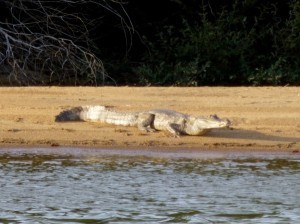 For example, Grice points out, crocodilians have been around for 170 million years, yet they still look much as they did at the start: “From the time of the dinosaurs to the present ‘rule’ of humanity,” he writes, “the crocodile has been swimming quietly in rivers and oceans, dining on members of the ruling parties, spilling more royal blood than Richard III.”
For example, Grice points out, crocodilians have been around for 170 million years, yet they still look much as they did at the start: “From the time of the dinosaurs to the present ‘rule’ of humanity,” he writes, “the crocodile has been swimming quietly in rivers and oceans, dining on members of the ruling parties, spilling more royal blood than Richard III.”
Nor are crocodiles alone in this unchanging dominance. Sharks and tarantulas are two nearly identical examples: Big brutes with big mouths and sharp fangs. Predators that basically mug their prey and have been around pretty much the same form for tens of millions of years. And why not? No point in changing something that works so well.
I was thinking of Gordon Grice when I decided to write Invasive Species. The history of life on earth has witnessed one phenomenally advanced creature after another rise…and then fall. No, none of them before us sent satellites into space…but none of them depended on those satellites for most of their most crucial communications needs, either.
In her “a prowl of malcontents” review, Ellen Joyce cheerleads for the end of civilization: “It was a great feeling to watch it all implode, just like I suspect it will someday.” I’m not sure every reader will feel the same way, but I do know that at least some will understand why I think our perch at the top of the pyramid is an unsteady one.
And why the events I created in Invasive Species seemed not only logical to me, but most likely inevitable.
The post Evolution, Extinction, and INVASIVE SPECIES appeared first on Marmaduke Writing Factory.
February 8, 2014
The Unlikely Writer Who Changed My Life
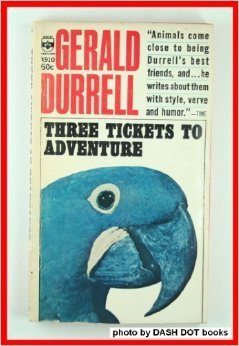 In an earlier post (“Why I Learned to Read”), I talked about how a story by the writer/adventurer Gerald Durrell forced me to read for myself. But Durrell’s influence on me didn’t end there: His nonfiction books–detailing his travels to the wildest regions of the planet–changed the course of my career, even my life. This is especially strange, given that Durrell often confessed that he wrote almost as an afterthought, mostly to support his greatest passion: Helping save endangered birds and animals through pioneering captive-breeding efforts.
In an earlier post (“Why I Learned to Read”), I talked about how a story by the writer/adventurer Gerald Durrell forced me to read for myself. But Durrell’s influence on me didn’t end there: His nonfiction books–detailing his travels to the wildest regions of the planet–changed the course of my career, even my life. This is especially strange, given that Durrell often confessed that he wrote almost as an afterthought, mostly to support his greatest passion: Helping save endangered birds and animals through pioneering captive-breeding efforts.
This city boy didn’t care about Gerald Durrell’s literary reputation. To me, reading Gerald Durrell’s memoirs and travel/nature books (The Bafut Beagles, My Family and Other Animals) was like traveling to other universes. But unlike the science-fiction novels I also devoured as a teenager, Durrell’s destinations–the island of Corfu in Greece, Cameroon in Africa, British Guiana (now Guyana) in South America–were reachable, at least in concept.
So I determined to reach them, any way I could. When people ask why I became a writer, I say, “I never had any choice in the matter.” But if they ask why I focused on travel, nature, the environment, why I choose to visit wilderness areas so often, I tell them, “Gerald Durrell made me do it.”
Still, though I have journeyed to Africa and South America, I never quite reached any of the specific destinations that Durrell wrote about with such affection and enthusiasm. Until now, that is.
I’m just back from two weeks in Guyana, which Durrell wrote about with joy in one of his earliest books, 1954′s Three Tickets to Adventure, about a visit to that country. It’s actually kind of a silly book, not one of his best, but that doesn’t matter: His descriptions of the country’s rivers, forests, and savannas, the creatures he saw there and the people he met, set my imagination alight.
So now, decades later, I’ve seen some of the same things Durrell did, including staying at the same ranch in the Rupununi Savanna he visited more than half a century ago. (I even met Diane McTurk, daughter of Tiny McTurk, a ranch owner Durrell profiled in Three Tickets.) I won’t write a nonfiction book about my experiences, as my inspiration did, but I am planning to set an important section of my sequel to Invasive Species on Guyana’s mysterious, ancient savannas. Maybe I’ll even name a character after Gerald Durrell.
It’s an amazing feeling, having walked in the footsteps of the writer who most changed the course of my life. It feels as if some kind of crucial circle has been closed at last.
The post The Unlikely Writer Who Changed My Life appeared first on Marmaduke Writing Factory.



